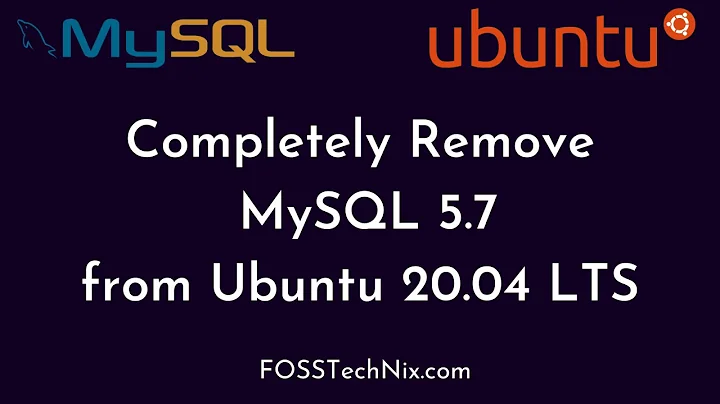Not able to uninstall MySQL with apt-get
Solution 1
Assuming you need to completely remove mysql related packages and its configs, please try below;
sudo apt-get remove --purge mysql* # will remove all relating packages and its config
sudo apt-get autoremove
sudo apt-get autoclean
And above command will completely remove all mysql related packages.
Hope it helps!!
Solution 2
If you installed MYSql from .tar.gz file, you can't able to uninstall it through Ubuntu's native package management system (apt-get).
Find the uninstall.sh script inside the extracted directory and run it to completely remove all the files related to MYSQL.
Solution 3
The following will uninstall everything that contain mysql.
apt-get remove --purge mysql*.*
apt-get autoremove
apt-get autoclean
Then run again the following to check any remaining packages.
dpkg --get-selections | grep -v deinstall | grep "mysql"
In my case, I only see mysql-common.
Reinstall and everything should work.
Related videos on Youtube
faizal
Updated on September 18, 2022Comments
-
faizal over 1 year
I had downloaded the generic Linux 64 bit MySQL 5.6.17 TAR archive from http://dev.mysql.com/downloads/mysql/ and installed on my 64 bit Ubuntu 14.04, following the instructions at http://dev.mysql.com/doc/refman/5.6/en/binary-installation.html.
I am having some problems with the server, so i want to uninstall and do a fresh installation. But if i try the usual
apt-get remove mysql-server(as per How do I uninstall Mysql?), i get :Package 'mysql-server' is not installed, so not removedI am guessing this is because i did not use apt-get to install in the first place. I had used
scripts/mysql_install_dbas per the instructions.So is there some other way to uninstall MySQL server or is it ok to just delete the installation folder?
Edit
$ dpkg --get-selections | grep -v deinstall | grep "mysql"gives the below result :
libdbd-mysql-perl install libmysqlclient18:amd64 install mysql-client install mysql-client-5.5 install mysql-client-core-5.5 install mysql-common install mysql-workbench-community install-
 AzkerM almost 10 yearsHi! I'm not too sure whether this will help but can you please try,
AzkerM almost 10 yearsHi! I'm not too sure whether this will help but can you please try,dpkg --get-selections | grep -v deinstall | grep "mysql"and post the output if you see any packages or matches. This command will output packages relating to the word mysql while printing all the installed packages. :) -
Avinash Raj almost 10 years
sudo apt-get remove mysql* -
 AzkerM almost 10 yearsAvinashRaj Exactly the same command that I was trying to comment on. @faizal please look into my answer
AzkerM almost 10 yearsAvinashRaj Exactly the same command that I was trying to comment on. @faizal please look into my answer
-
-
faizal almost 10 yearsDoes such a script exist? I could not find it in my installation folder(find $MYSQL_HOME -name 'uninstall.sh')
-
Avinash Raj almost 10 yearsMost of the .tar.gz files comes with an un-installation script. I don't know about MYSQL.
-
faizal almost 10 yearsThanks AzkerM. But i am really nervous about doing this now. I have managed to make the existing MySQL work for now after a lot of experimenting. If i do face more problems, i will surely give this a try.
-
 AzkerM almost 10 yearsIt is always a best practice to make a use of official repo's available within Ubuntu unless you've no other choice. Anyhow, its your call & in any event we're always happy to help. :)
AzkerM almost 10 yearsIt is always a best practice to make a use of official repo's available within Ubuntu unless you've no other choice. Anyhow, its your call & in any event we're always happy to help. :) -
faizal almost 10 yearsI did not use the Ubuntu repo because it was downloading MySQL 5.5, while 5.6 was available for download from the mysql site. I have realized now that was an error of judgement :(
-
 AzkerM almost 10 yearsWell there is a PPA for MySQL 5.6 given with an explanation on Launchpad which you should have tried. I also see certain bugs reported relating to this. Anyhow, there is no victory without pain. If your package is working and issues sorted, good to go though.
AzkerM almost 10 yearsWell there is a PPA for MySQL 5.6 given with an explanation on Launchpad which you should have tried. I also see certain bugs reported relating to this. Anyhow, there is no victory without pain. If your package is working and issues sorted, good to go though. -
ipcjs about 7 yearsyou right. The script is
/root/oneinstack/uninstall.shon my server. -
Claus about 7 yearsSuperb. Works like charm.
-
Lajos Mészáros over 2 yearsA little side note is that I had to go to / to execute the remove --purge command. Standing in my home directory resulted in apt-get not being able to locate packages

![[Re-upload] MySQL Tutorial - Re - Install (install & uninstall) MySQL pada Ubuntu](https://i.ytimg.com/vi/E6Jogc9nJ3s/hqdefault.jpg?sqp=-oaymwEcCOADEI4CSFXyq4qpAw4IARUAAIhCGAFwAcABBg==&rs=AOn4CLB0Vn4O65bYKJY5iPDGYqpokTF2GQ)


